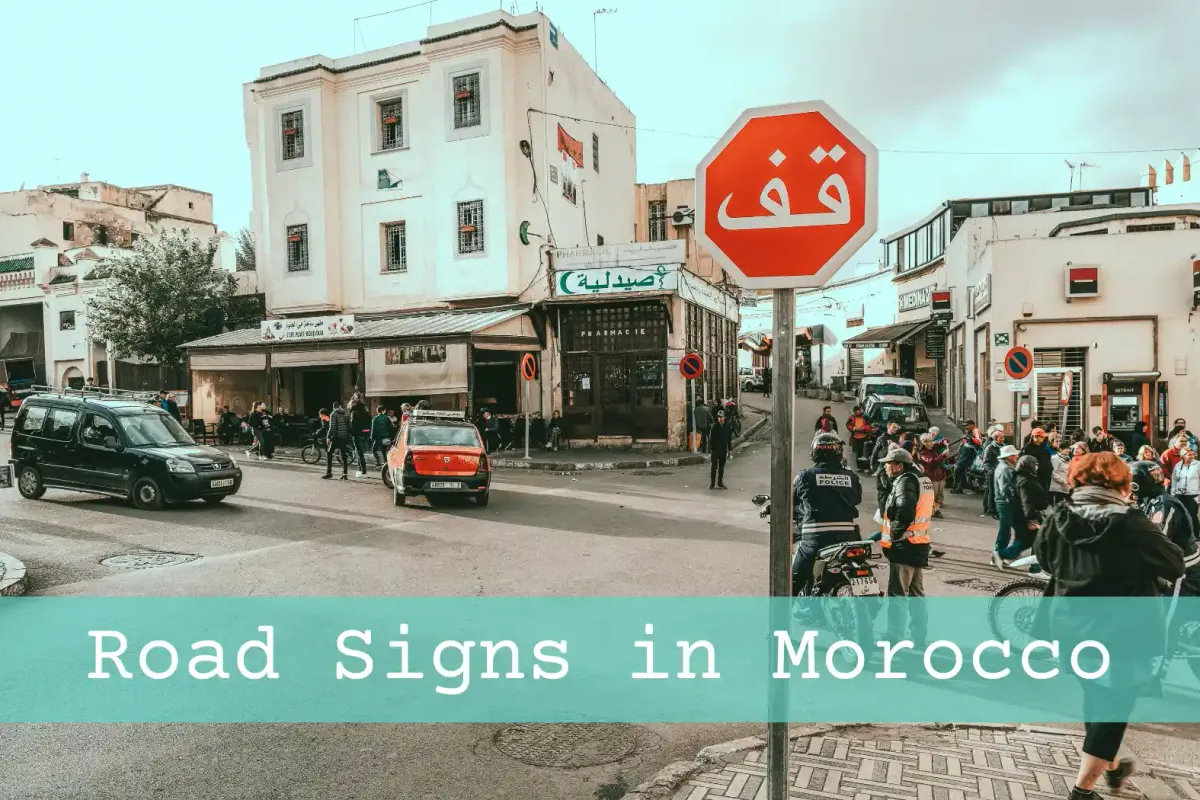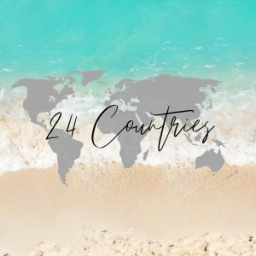27 Essential Tips and General Advice For Driving in Morocco
Before driving from Marrakech to Merzouga, I’d never driven outside the UK, and I’d never driven on the right side of the road. However, after experiencing driving through Morocco, I’d highly recommend it to anyone!
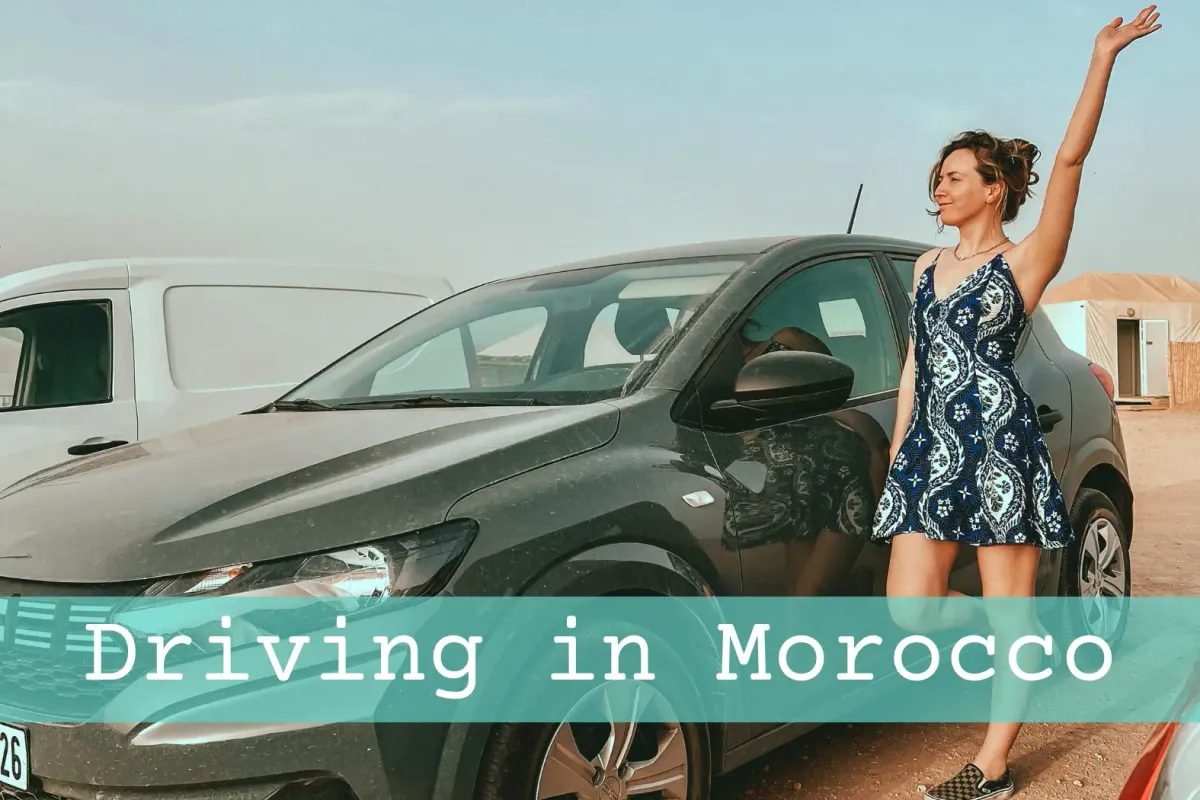
This article contains affiliate links. Click the arrow to find out more information.
Some of the links below are affiliate links, meaning, at no additional cost to you, I will earn a commission for purchases made through some of the links in this post. However, please note I only recommend products that I have verified and/or personally used.
Driving in Morocco is a fantastic way to see and experience the authentic side of the country. When I booked a trip to Morocco for ten days, I knew that I wanted to visit the Sahara Desert. However, when I started researching Morocco, I quickly realised that the country was much bigger than I expected and that getting from Marrakech to Merzouga, the gateway to the Sahara Desert, wasn't as easy as I thought it was going to be.
The public transport options weren’t the best, plus I didn't want to visit only Merzouga - I wanted to stop off at multiple places along the way, including the Tisderine bends in Dades Valley and have an overnight stay at Ait Ben Haddou. The only way I could make it work was by driving, so I looked into hiring a car - much to the dismay of my parents!
Before driving from Marrakech to Merzouga, I’d never driven outside the UK, and I’d never driven on the right side of the road. However, after experiencing driving through Morocco, I’d highly recommend it to anyone! I’ve got some great stories to tell from driving in Morocco, from managing to blab my way out of a fine at a police checkpoint to avoiding all sorts of things on the road.
I did so much research about driving in Morocco before my trip, and I picked up some great tips when I was there, which I’m going to share with you in this post!
Skip Ahead...
Help My Blog Grow: Share My Pinterest Pins!
Hover over the images, and the Pinterest save button will appear in the top left. Click it to share on Pinterest. Many thanks!
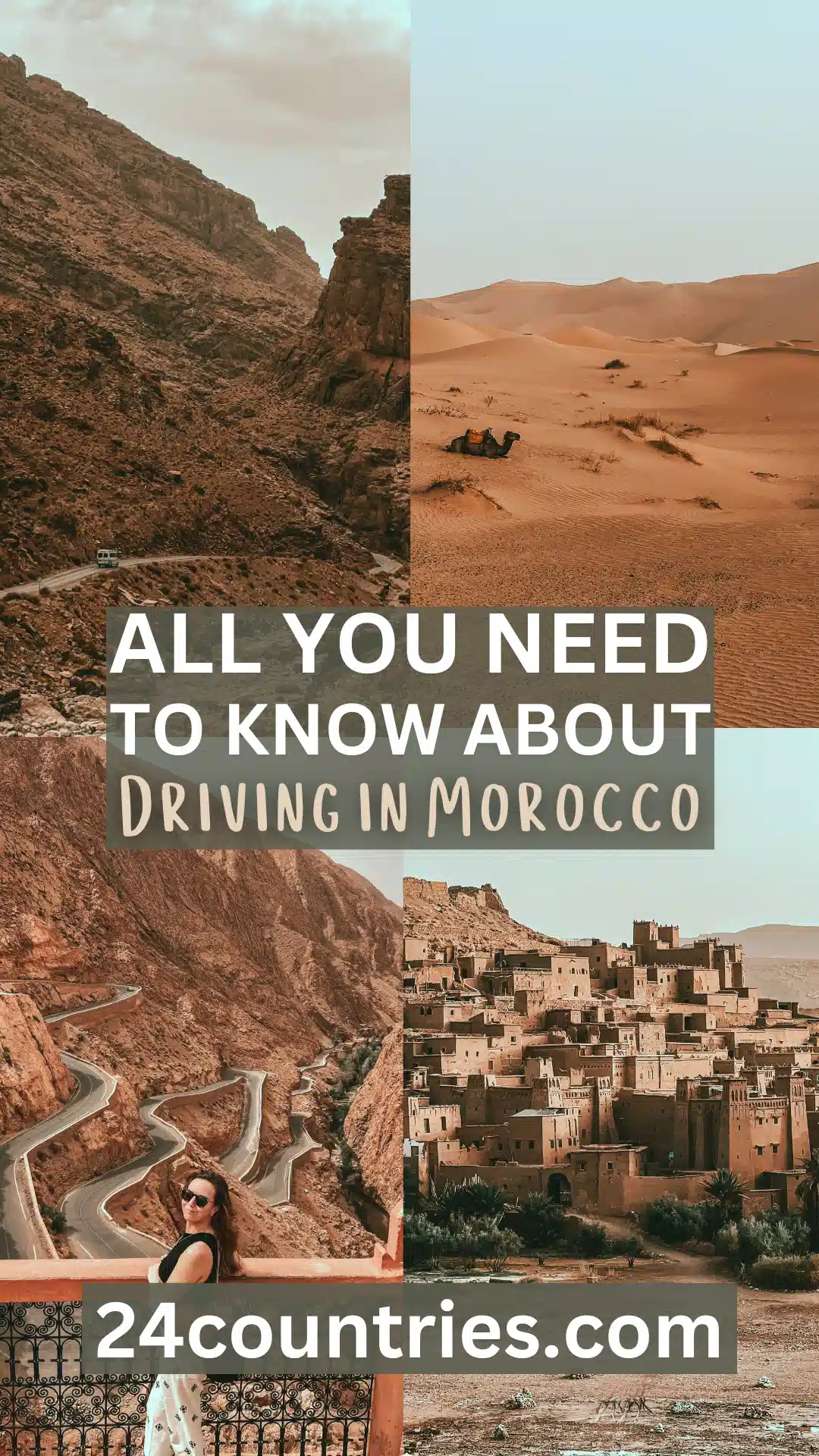
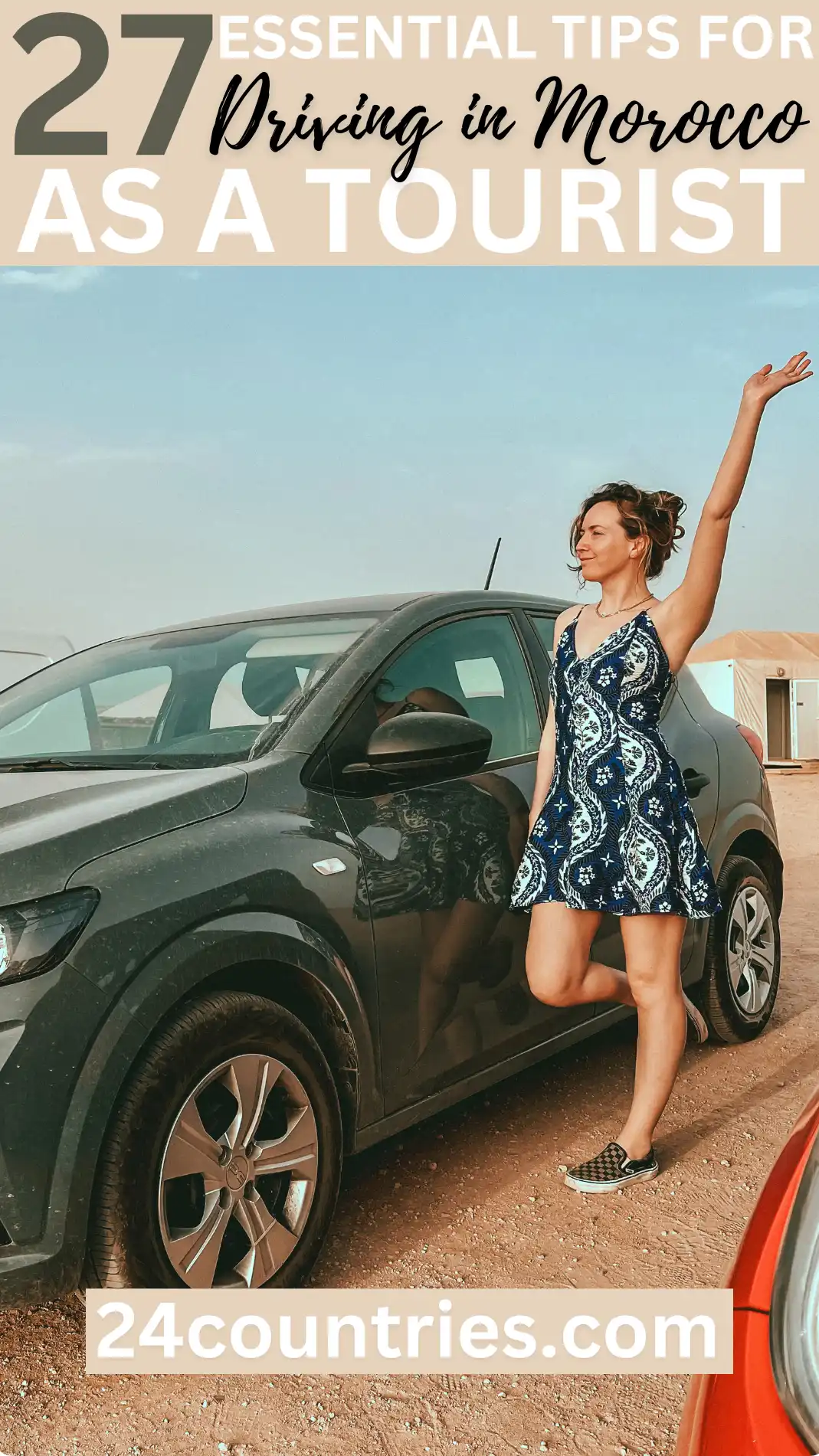
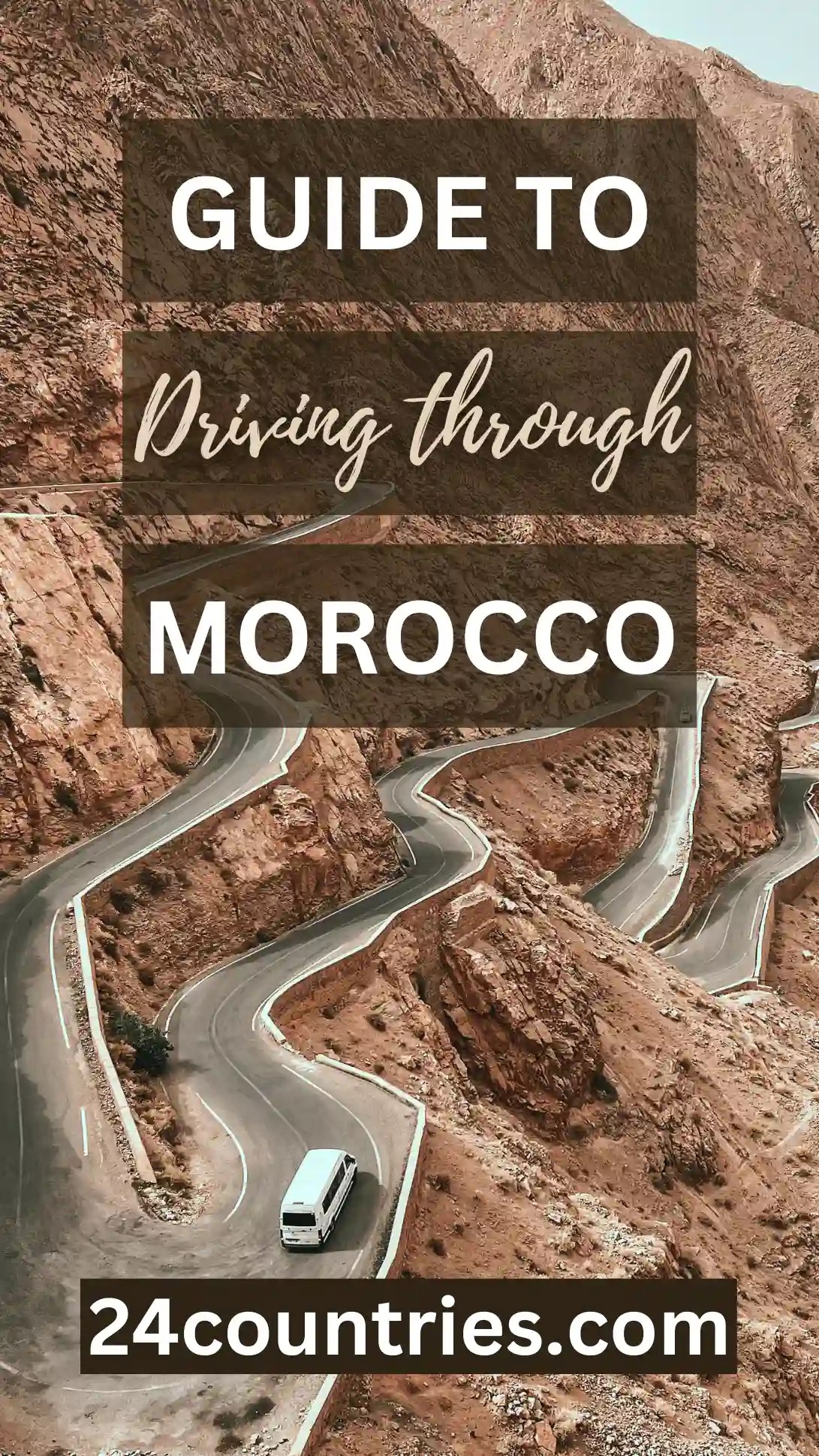
27 Essential Tips and General Advice For Driving in Morocco
Make Sure you Hire a Car in Morocco Through a Reliable Company
When I was looking into car rental companies in Morocco, it was quickly apparent that they aren’t all as reliable as each other. The biggest piece of advice I can give you when it comes to renting a car in Morocco is to do your research! Check that the car rental company is legit by using TrustPilot or a similar website, look at the reviews of the company to make sure people are happy with their car rental and aren’t reporting any scams, and look at the terms and conditions, including how much the excess costs, check theft protection, and insurance is included. Picking the wrong car rental company can be an expensive mistake to make!
After doing my own thorough research, I decided to go for Medloc Maroc, and honestly, I don’t have a bad word to say about them. They made the whole rental process really smooth. The communication, which was mainly done through WhatsApp, was really easy and straightforward. They brought the car to me, just outside the medina of Marrakech, which saved me from having to make my way out to the airport to pick it up. They also encouraged me to take pictures and videos of the car when we first met, which was quite reassuring. I also got the exact car that I had requested, which isn't guaranteed when renting a car in Morocco. Lastly, as soon as they checked the car, they sent me proof to show they had returned the full deposit to me.
If you want to compare car rental companies, then use DiscoverCars or AutoEurope. Both are very reliable websites that will help you to find the best deal by comparing the prices and ratings of hundreds of car rental companies in Morocco.
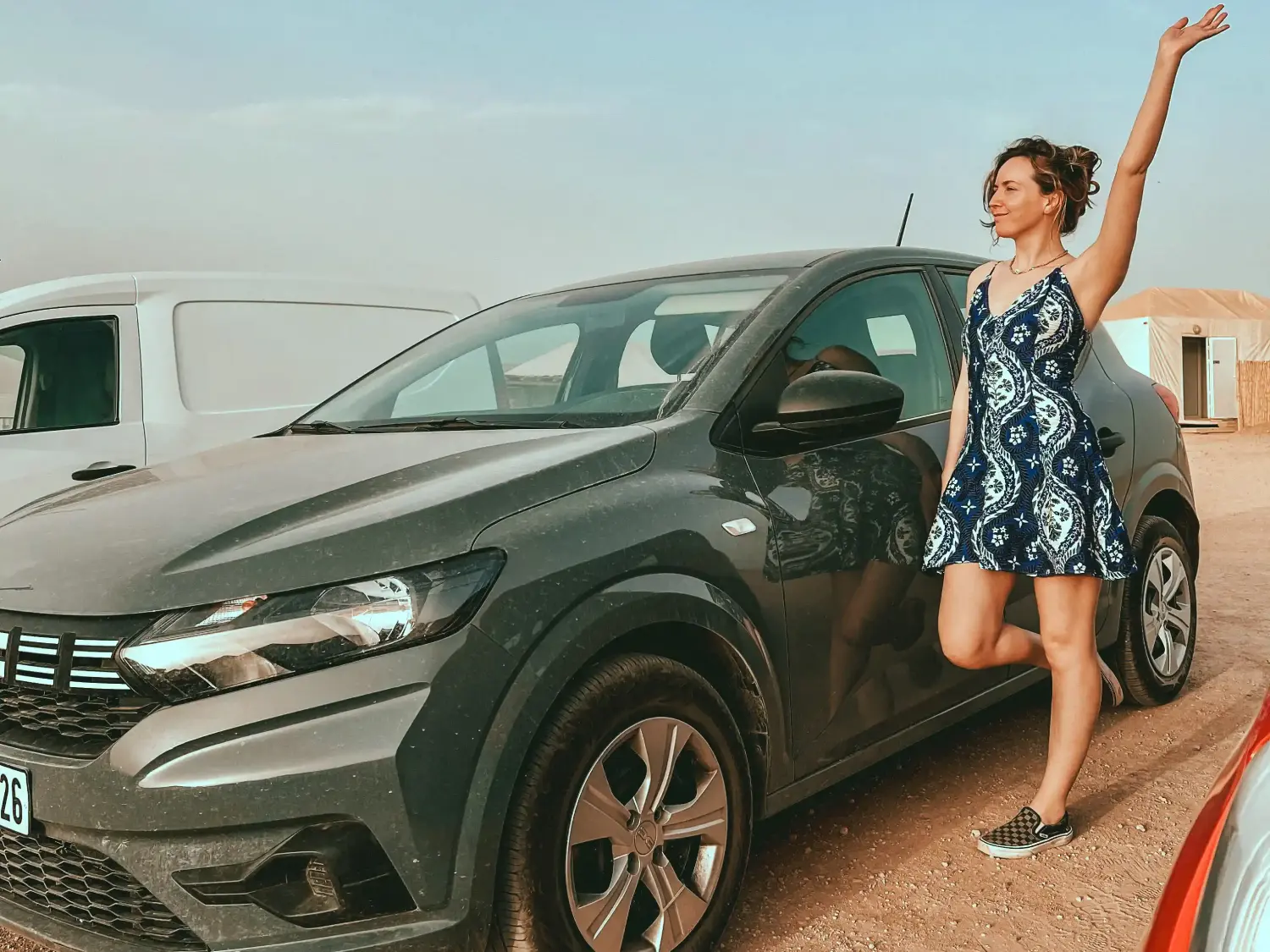
Get Additional Insurance to Cover the Car Hire Excess if Anything was to Happen to the Car
It’s pretty standard to have to put down a deposit with most car rental companies in Morocco, and let me tell you, they don’t come cheap! This deposit protects the car rental company if anything happens to the car. For example, during your rental, if the car was to be damaged or stolen, then they would take the money from your deposit to pay for the issue.
The deposit for my rental car with Medloc Maroc cost €1200. Even though I’d done my research and carefully picked Medloc Maroc to rent my car, I’d still seen so many people talk about scams happening with car rental companies in Morocco. So, I wanted to ensure that I protected myself from losing such a large amount of money. I decided to take out an insurance4carhire excess policy. This meant that if any dispute were to happen regarding my car rental deposit, I could claim the money through the insurance4carhire company. The insurance only cost £26, and luckily I didn’t need to use it, but I would much rather pay that than lose out on €1200!
Petrol is Filled Up for You in Morocco
This one isn’t that important but worth knowing, especially if you come from a country like the UK where it is not common for someone to fill up your petrol. In Morocco, you simply drive up to the petrol station, and someone will come to your window. They’ll ask you whether it's petrol or diesel. Then, they’ll fill up your tank and come back to your window for payment. I found that I could’ve really done with some basic French to speak to the petrol station attendants, as there was a bit of a language barrier.
Also, I don’t know what it was about the petrol in Morocco, but it lasted way longer than the petrol in the UK. To get from Marrakech to Merzouga and back, which is at least an 18-hour roundtrip, I only had to fill up my tank twice. This meant I only spent a total of £94 on petrol over the week driving in Morocco. There are also petrol stations everywhere in Morocco, but just in case, I made a rule of thumb that when my tank got to just less than half, I stopped off at a petrol station to fill back up. I would recommend you adopt this rule when driving in Morocco to ensure you don't run out of petrol in the middle of nowhere!
Beware of All Sorts of Things Being on the Road in Morocco
Prepare to share the road with a lot more than just other cars. From motorbikes and trucks to horse-drawn carriages, carts pulled by donkeys, and everything in between - Moroccan roads are chaotic! This is especially true in larger cities like Marrakech when things seem to go in every direction and at every speed: some drive painfully slow, and others painfully fast. I'd recommend that you just take it slow. Moroccans are used to the roads, so they will just naturally weave around you. As you move out of the city, the roads become much quieter and are much easier to navigate, in my opinion.
In Morocco, you’ll need to get used to the sound of honking! There’s a multitude of reasons for honking in Morocco, and it’s not only done to signal annoyance. People also honk to let you know they are there, warn you of any danger, or simply encourage you to get out of their way. You might even find yourself honking a couple of times when you are there too!
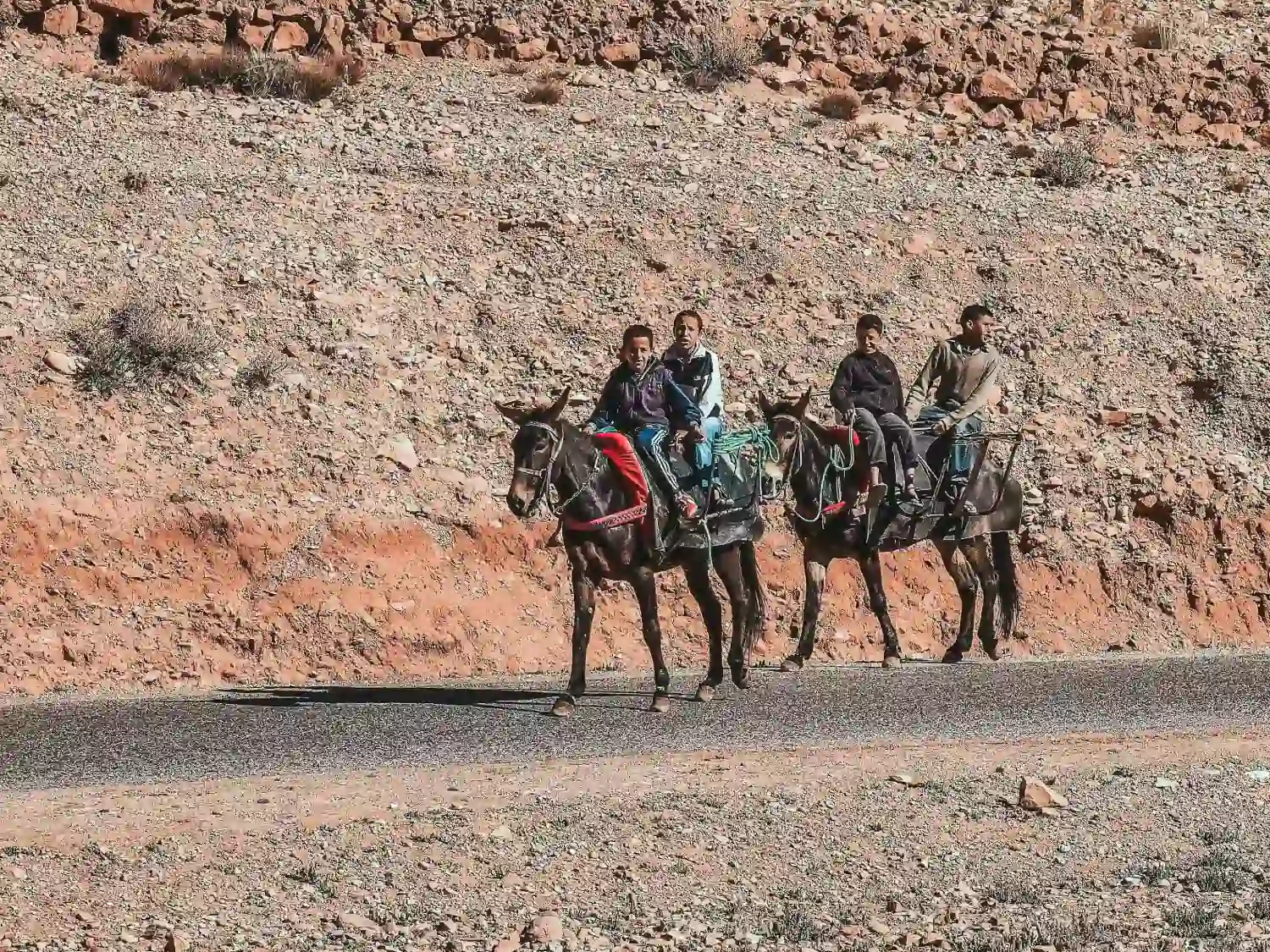
Automatic Cars are More Common in Morocco
When I was researching car rental companies in Morocco, automatic cars seemed to be much more common than manual cars and often cheaper. This posed a bit of an issue for me… having never driven an automatic before, I certainly didn’t want to start in Morocco. In the UK, automatic cars aren’t as popular as manual ones. Therefore, I had to contact my car rental company to request a manual car specifically. They tried to charge me an extra €30 per day for the manual car, but I managed to get them to provide it for the same price they’d quoted me for the automatic, and luckily, on the day of rental, they actually showed up with a manual car. If there is a certain type of car that you prefer to drive (automatic or manual), make sure that you communicate that with your car rental company beforehand.
Take Photos or Videos of your Moroccan Car Rental
Before you drive off into the sunset with your rental car, make sure you take some detailed pictures and videos of the car. Pay particular attention to any scuffs, scratches, dents, and the tyres. This is just in case the company tries to claim that you caused any damage to the car. The company I hired my rental car with encouraged me to take pictures and videos of the car, which I found quite reassuring.
Police Checkpoints are Everywhere in Morocco
Police checkpoints are extremely common in Morocco, and they are often when you least expect it. For example, you can be driving around a corner and *BAM* police checkpoint or driving into a quaint Moroccan town and *BAM* police checkpoint. If you are lucky enough to see one in the distance, then you’ll notice a lot of traffic cones, other vehicles slowed right down, police standing on the road talking to cars, and police checkpoint signs in mostly French and Arabic. When I first started driving in Morocco, I stopped at every police checkpoint. I noticed that they were giving me a confused look and waving me on. It wasn’t until the third or fourth time I stopped that I was informed that I didn’t have to stop at every single one. You do need to slow down, but the police will wave at you if they want you to stop.
From the amount of YouTube videos I’ve watched and people I’ve spoken to about driving in Morocco, getting driving fines seems to be pretty common. I watched a YouTube video in which someone got three fines in one day! I also got talking to a fellow Scot who I met in the Sahara Desert, and they also had been stopped twice by the police. They managed to avoid the first fine but got fined the second time. The most common fines seem to be for speeding, not fully stopping at a stop sign, and driving past the police checkpoint when waved down. Also, the fines aren’t cheap either, costing around €40 for each fine.
Well, I’m here to tell you that it is entirely possible to drive in Morocco without getting fined! I got stopped once at a police checkpoint for not stopping on a roundabout, and I somehow managed to blab my way out of getting a fine!
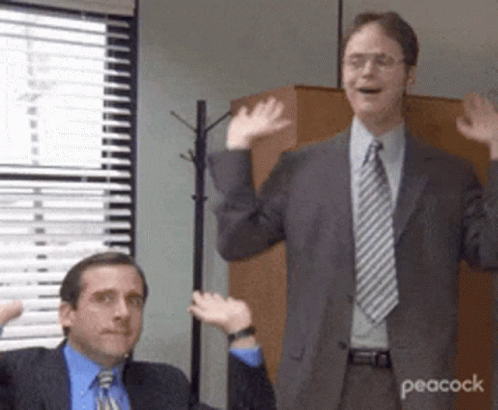
I half expected to get fined at some other point, but it never happened! Surprisingly, a couple of days into driving in Morocco, I started to anticipate when a checkpoint was going to crop up. Another good indication that a police checkpoint is coming up is when other Moroccans flash you, or they start to drive really slowly.
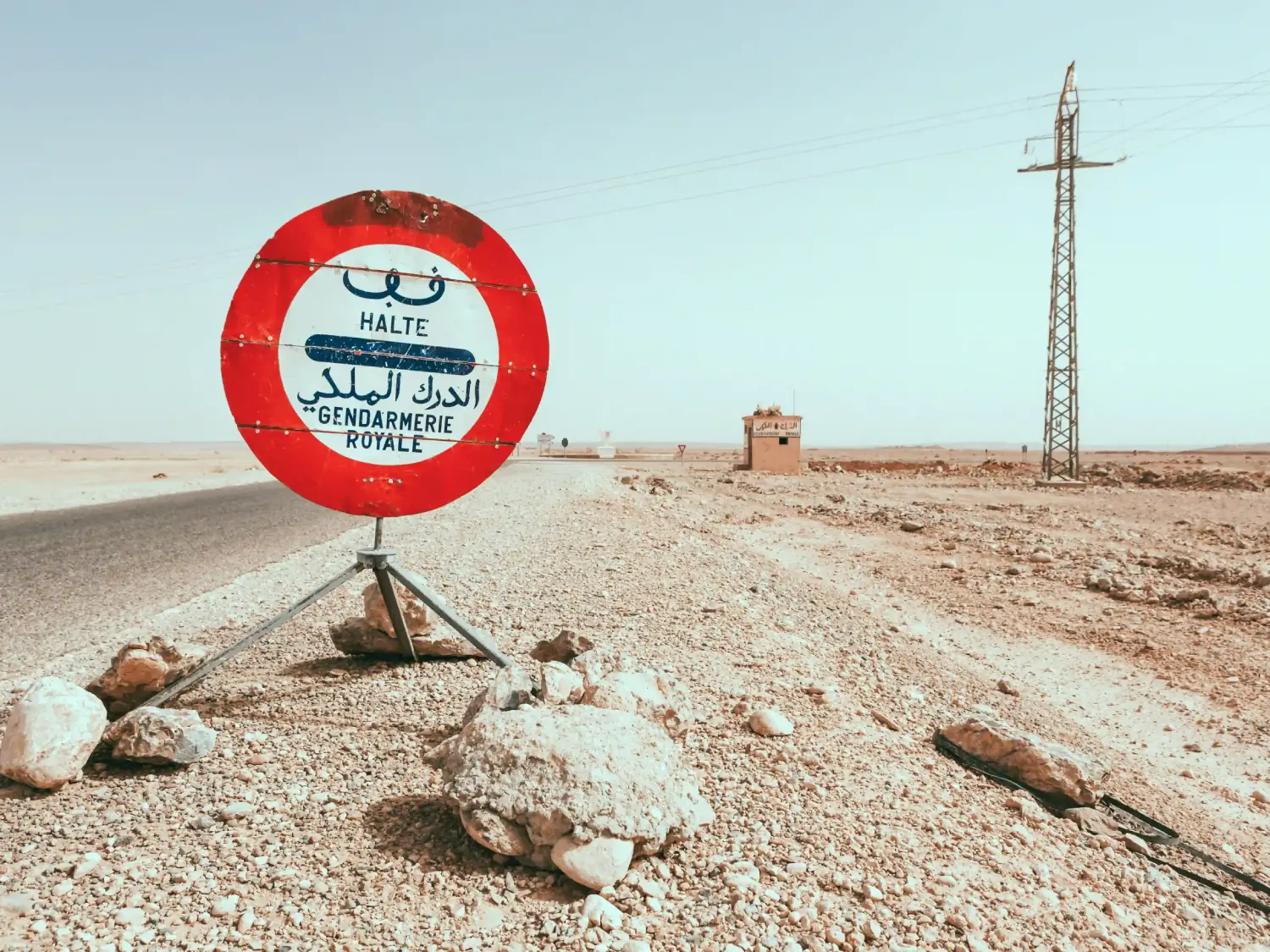
Get a Moroccan SIM Card
Getting a Moroccan SIM card is absolutely essential when you are planning on driving through Morocco. It’s especially important in case of emergencies: a Moroccan SIM card will ensure you have a good, stable connection to use the internet and make phone calls throughout Morocco, including desolate parts of the country like the Sahara Desert, where you don’t see other cars or places for miles, sometimes even hours!
Another reason to get a Moroccan SIM is if your phone company charges you through the roof for calls and using data in Morocco. My phone company was going to charge me €7 for every minute I was on a phone call and €11 for every MB of data, which is just ludicrous! This meant if I got into any unfortunate situations when I was driving where I needed to contact someone, it would cost me a fortune.
Don’t make the mistake of picking up your Moroccan SIM card at the Marrakech airport (guilty!), as you’ll pay around 200 MAD (~€18) for 20GB of data. Whereas, if you get one at the Jemaa el-Fnaa square in Marrakech, you’ll only pay around 50MAD (~€5) for 100GB. Either way, they will set up the SIM card for you.
If you want to sort your Moroccan SIM card before you get there, get a Yesim international electronic SIM. Their eSIM offers a stable internet connection in 150+ countries worldwide, and it’s pay-as-you-go! It also means you don’t have to fiddle about trying to physically swap your SIM cards over and praying you don’t lose your original one. You simply just have to select the country you are in, and it’ll all be sorted electronically.
Prepare to Overtake in Morocco… A LOT
When I first started driving in Morocco, I naively thought that even if I got stuck behind another vehicle, I would never overtake. Well… I’m here to tell you that you will probably overtake a lot, and it’s more of a necessity than anything. When you have five hours of driving ahead of you in Morocco, nobody’s got time for driving 20 km/h on an 80 km/h road because you’re stuck behind another vehicle.
There are opportunities to overtake throughout Morocco. As you get further away from the bigger cities, the roads get straighter, and you can see for miles. My advice would be to give the vehicle in front plenty of space, don’t rush overtaking, and make sure that the other side is clear and that it’s safe to overtake. In a typical driving day in Morocco, I must’ve overtaken at least five times. Don’t just expect that you’ll only be overtaking vehicles, you’ll also be overtaking animals, too! There are sections of the road you are allowed to overtake and other sections you aren’t, the road signs will indicate whether you can overtake or not.
Learn Some of the Important Road Signs in Morocco
Read my post about the 9 Need-To-Know Road Signs in Morocco. This will teach you about the most common road signs you’ll see when driving in Morocco, from stop signs to speed limit signs. One of the most important signs is in the picture below. It means ‘stop’ but is mostly found in Arabic throughout Morocco. When you see this sign, you need to stop fully, not just slow down. It can be found in the weirdest places, like the middle of a roundabout, and it’s the reason I almost got a driving fine in Morocco!
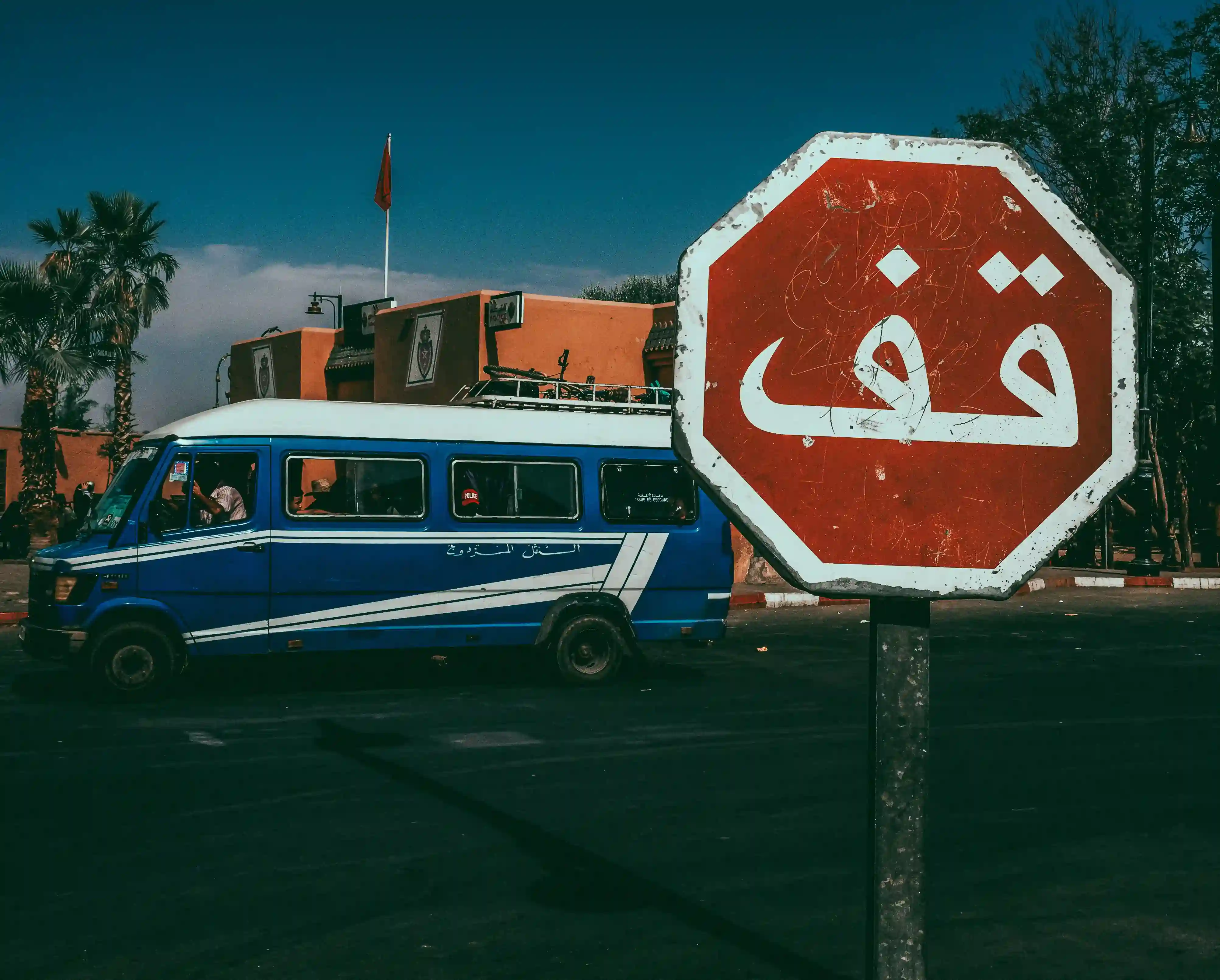
Learn Some French or Arabic to Be Able to Converse in Morocco
Having a good knowledge of French or Arabic will help you massively when you are in Morocco. English isn’t as common as you might think, and I found there was quite a language barrier. It will also help you understand the road signs in Morocco. The basic French I learned in school helped me to a point in Morocco, and Moroccans really respond to you trying to speak their language. However, I struggled to communicate with petrol station attendants or police officers at checkpoints, so try to focus on learning French or Arabic words associated with cars and driving, like ‘petrol’ or ‘diesel’, ‘full-tank’ or ‘half-tank’ etc.
Stick to the Moroccan Speed Limits
The police in Morocco are really strict about you sticking to the speed limit. If they catch you even going 5 km/h above the speed limit, they will likely fine you. However, the road signs in Morocco tend to be quite good and regularly inform you of what the speed limit is.
It’s worth bearing in mind that speed limits for Moroccan towns and cities tend to be around 40 km/h or 50 km/h, for open country roads, it is usually about 80-100 km/h, and for motorways, it is about 100-120 km/h.
Check if you need an International Driving Permit in Morocco
For UK citizens looking to drive in Morocco, you will need to get a 1968 International Driving Permit (IDP) beforehand. You can pick up an IDP in person from select stores that have Paypoint. It only costs £5.50, and it’s really easy to get. All you need is proof you live in the UK and, that you are over 18 years of age and have a full UK driving licence. You’ll also need to bring a passport photo with you.
My IDP never got checked when I was in Morocco, but it’s better to have it just in case of the odd occasion that they do check it! If you aren’t from the UK, you will need to check with your government if you need an IDP for driving in Morocco.
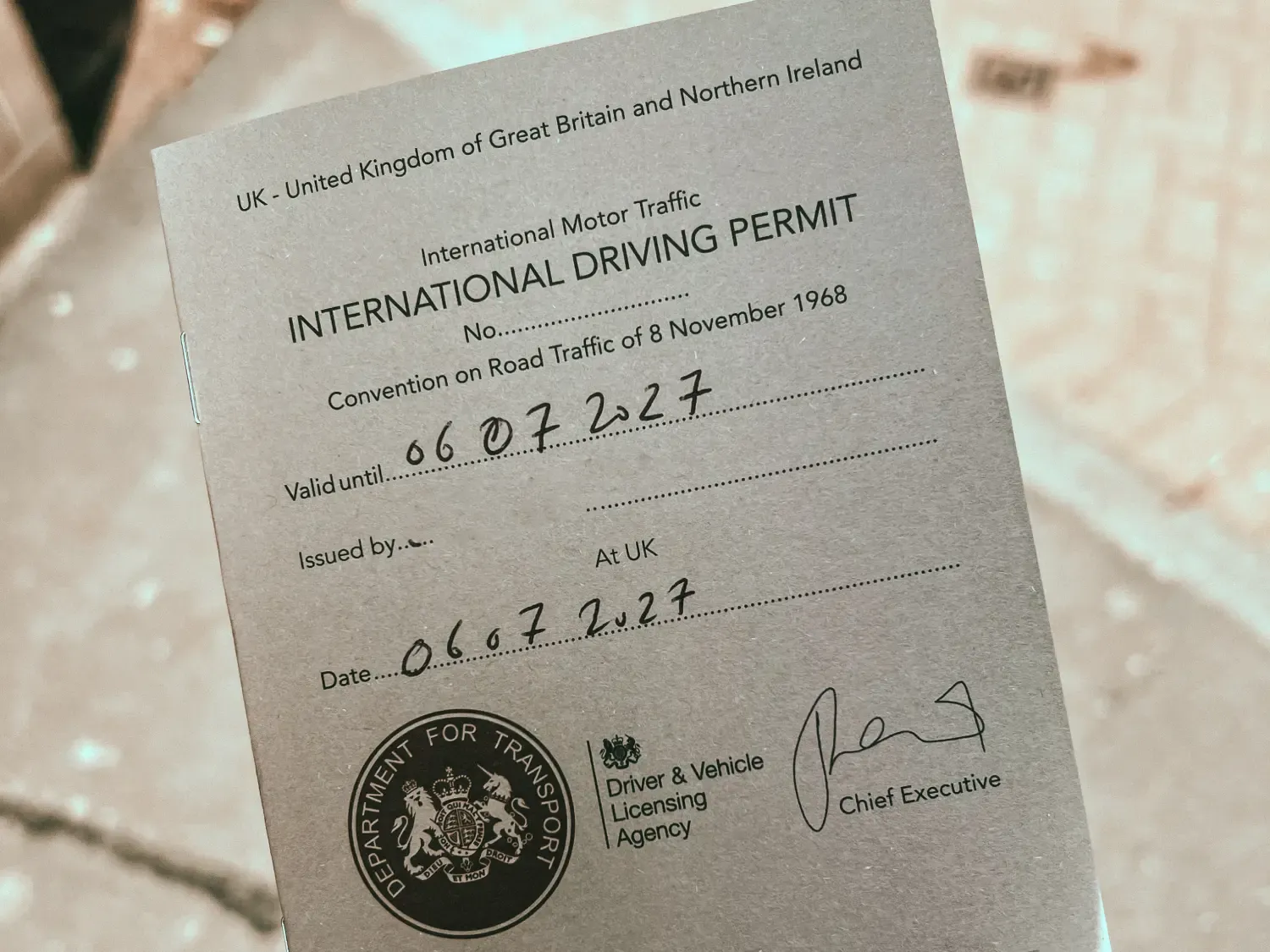
Moroccans Drive on the Right-Hand Side of the Road
Like the majority of other countries in the world, Moroccans drive on the right-hand side of the road. For those of us who come from the minority of countries that drive on the left, it can be quite an adjustment getting used to driving on the right side of the road. For me, the weirdest part was the fact the steering wheel is on the left, and you have to use your right hand to change gears. You do get used to it quite quickly though!
Prepare for All Types of Terrain in Morocco
When you are in the larger Moroccan cities or just on the outskirts, you can expect well-maintained tarmac roads. However, as you venture further away from major cities or off the main roads, then the roads tend to get a bit rougher and can consist of all types of terrain.
When I was trying to reach my accommodation in Merzouga, my sat nav told me to go right even though there was no road there - I ended up having to drive off-road on gravel for 10-15 minutes. Also, driving to my accommodation in the Agafay desert was the worst road I’ve ever driven; I don’t think it can even be classified as a road!
Due to the earthquake that hit Morocco in 2023, some sections of the roads have had to be redirected due to damage, and the new diversions are usually dirt or gravel roads. Morocco is also injecting a lot of money into the development of their roads, which means you can expect a lot of roadworks. When I was driving past Ouarzazate to Dades Valley, the road suddenly turned from nice tarmac to gravel roads for miles due to roadworks.
Opt for a 4x4 for Driving in Morocco
When I drove from Marrakech to Merzouga, I hired a Dacia Sandero hatchback car, and it got me safely from A to B. I found it a really reliable car and one that I would happily own back home. However, in moments when I had to venture off-road in Morocco, it was quickly evident that it wasn’t designed for that, and the whole time, I found myself hoping that the tyres wouldn’t burst!
As mentioned in the point above, you can’t always be guaranteed driving on tarmac roads in Morocco. Sometimes, you have to drive on gravel or dirt roads, or poorly maintained roads. A 4x4 car would be much more comfortable for navigating these roads, and it would mean you could venture off the main roads and explore more of the Moroccan countryside like Fint Oasis just outside Ouarzazate.
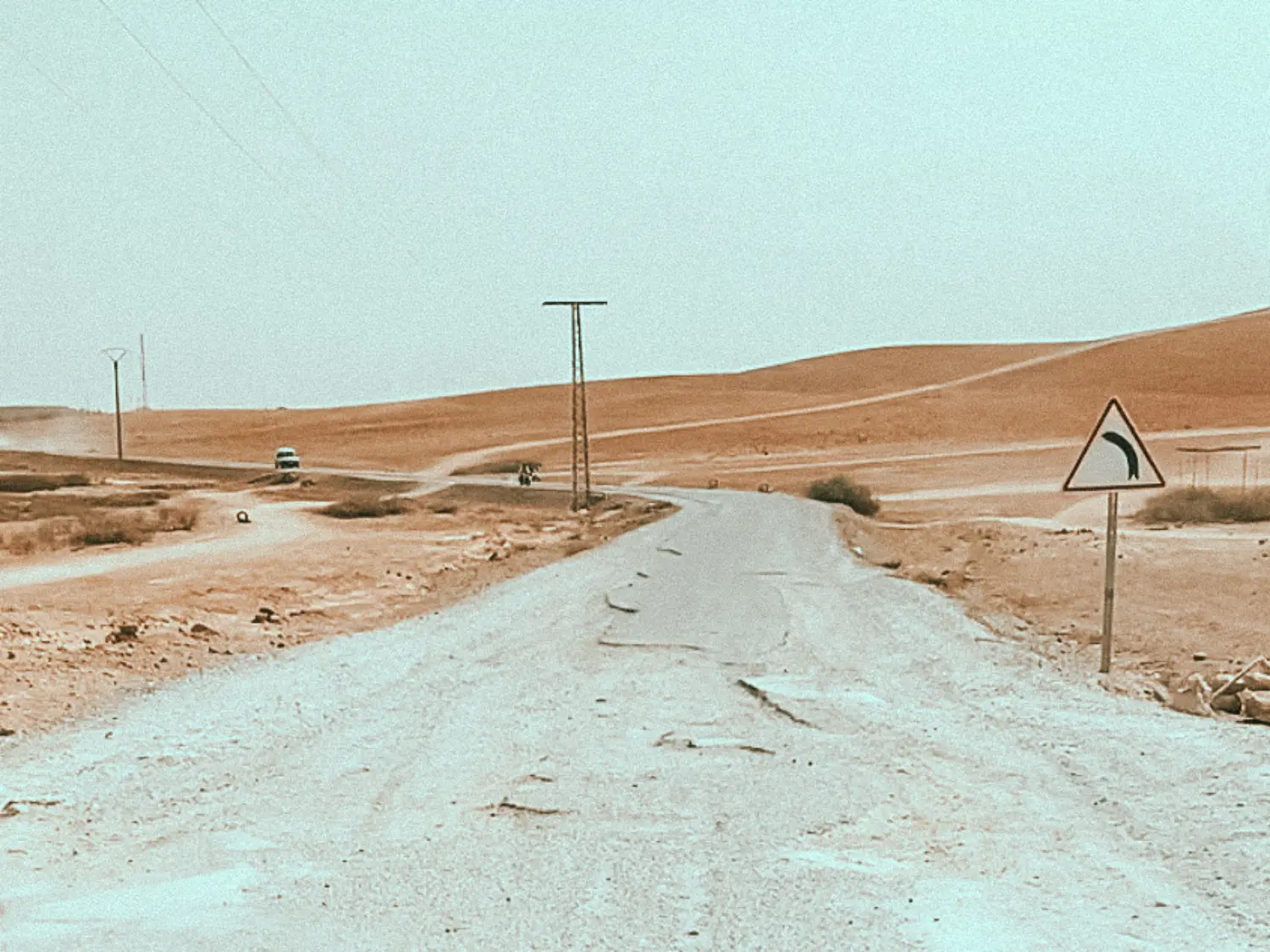
You Can Use Your Driving Licence From Your Country of Residence
To drive in Morocco, you must have a full driving licence that is valid in your country of residence. For UK citizens, you can drive for up to one year in Morocco with your full UK driving licence.
Make sure you have all of your documentation (Passport, International Driving Permit, and Driving Licence) in an accessible place in your car. Your car rental company should also provide you with their contact details and insurance documentation, which you may have to show at a police checkpoint.
Have a Basic Knowledge of Cars
A basic knowledge of cars is a necessity! The thing that struck me the most when I was driving to Merzouga was just how desolate the location was. We didn’t see any other cars or places for miles. This would’ve made for a rather scary situation if we had broken down, as we could’ve been out there for ages waiting for help. Even knowing how to change a tyre can be so beneficial when driving in Morocco! That way, if your tyre ever bursts, you can quickly change it with the spare and get back on the road.
Avoid the Large Moroccan Cities
Now, I can only speak about Marrakech, but trust me when I say the traffic there is pandemonium. I’ve heard from others that the larger Northern cities in Morocco are exactly the same. There’s everything on the road: going in every direction, at every speed, and no one seems to stick to their lane. I tried to spend as little time in Marrakech as possible. I got my rental car dropped off just outside the medina at 7 am when the roads were quieter and immediately started driving away from the city to the Atlas mountains.
Do not go into the old medinas in your rental car. The roads in the medina are so narrow and are very difficult to navigate!
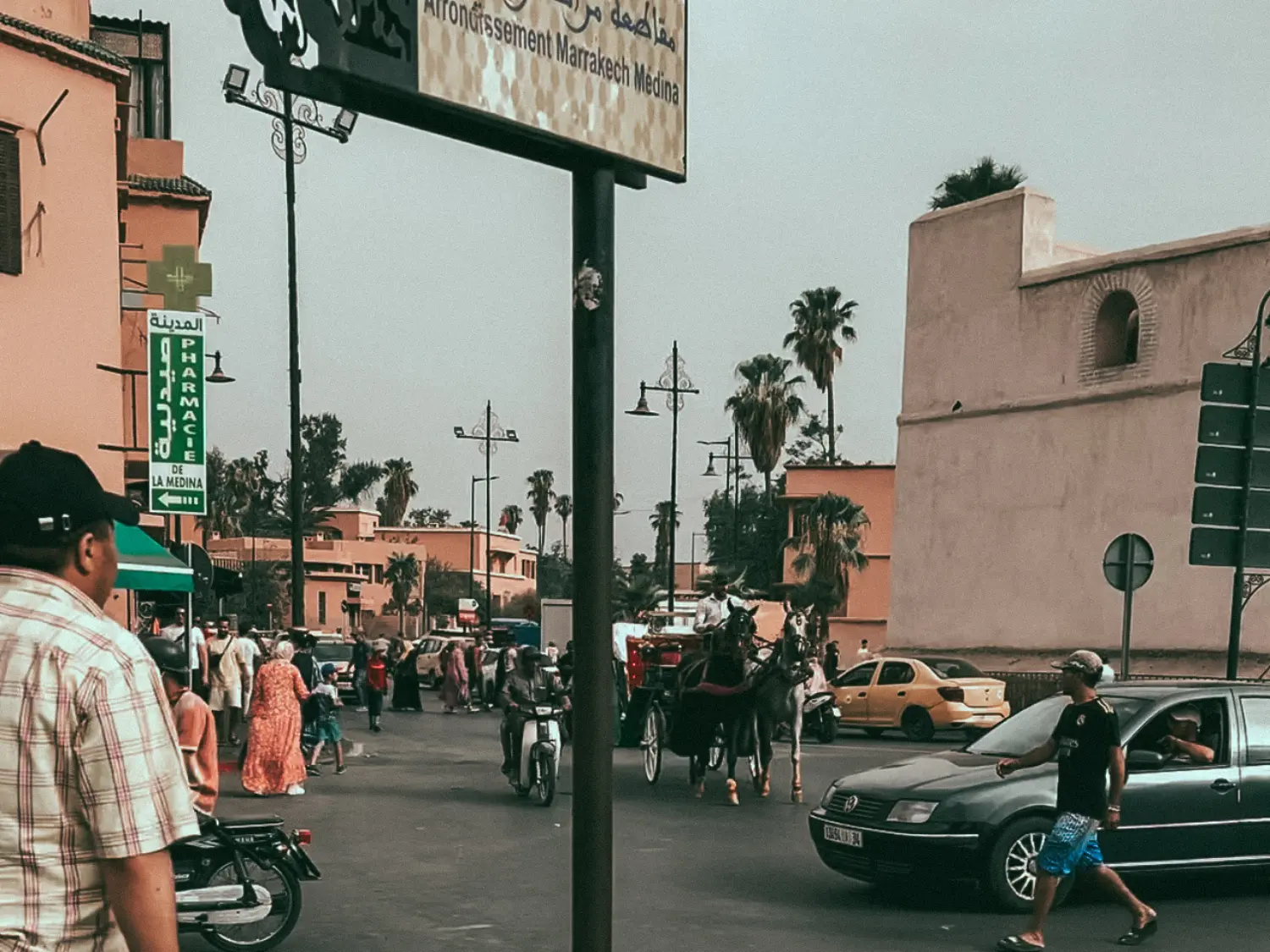
Don’t Drive at Night in Morocco
Driving in Morocco at night can be quite dangerous. The roads in the bigger cities get even busier and more chaotic at night. While in the countryside, although the roads may be a lot quieter, they tend to be poorly lit. Some of the speed bumps and potholes are difficult to see even during the day, so they are almost impossible to spot at night. It’s also harder to see the animals in Morocco at night as they don’t have reflectors. Other cars also tend to use their headlights only when it’s really dark outside. If you can, I'd recommend you avoid driving at night in Morocco.
Download Google Maps Offline for Driving in Morocco
Even if you buy a Moroccan SIM, you don’t want to use up all your data using Google Maps. A handy way to conserve data and avoid having to connect to dodgy Wi-Fi is by downloading Google Maps offline. This was a lifesaver for us in Morocco otherwise, we wouldn’t have a clue where we were going! I also found it pretty interesting (and a wee bit scary) that Google Maps can track your exact location even when in flight mode. Read this handy guide to understand how to download Google Maps offline.
The Atlas Mountains Road is Not Scary to Drive
When I was researching driving in Morocco, there were a lot of warnings about the Atlas Mountains roads. The main road through the Atlas Mountains is perfectly safe; I can’t speak for diverting off the main road onto more minor roads, though.
I also discovered that people were often confusing the Tizi ‘n’ Tischka pass in the Atlas mountains, which connects the city of Marrakech to Ouarzazate, with the Tisderine bends in Dades Valley. I drove both of them when I was in Morocco and actually went out of my way to drive the Tisderine bends.
There’s nothing to worry about with the Tizi ‘n’ Tischka pass; the road isn’t as bendy or dangerous as people make out. It’s also really well-maintained, and there are areas for passing too, so you can take your time and let other people by if they are in a hurry.
On the other hand, the Tisderine Bends in Dades Valley is considered much more dangerous, and I was also a wee bit worried about driving it. However, after talking to some locals, they said that it was dangerous in the past, but nowadays, it is perfectly safe to drive. Well, I’m here to tell you that it’s not as bad as it looks at all. It was one of the highlights of my whole trip. I really enjoyed driving the Tisderine Bends - it was so much fun! At the top, there is also the most incredible viewpoint over the road and the valley.
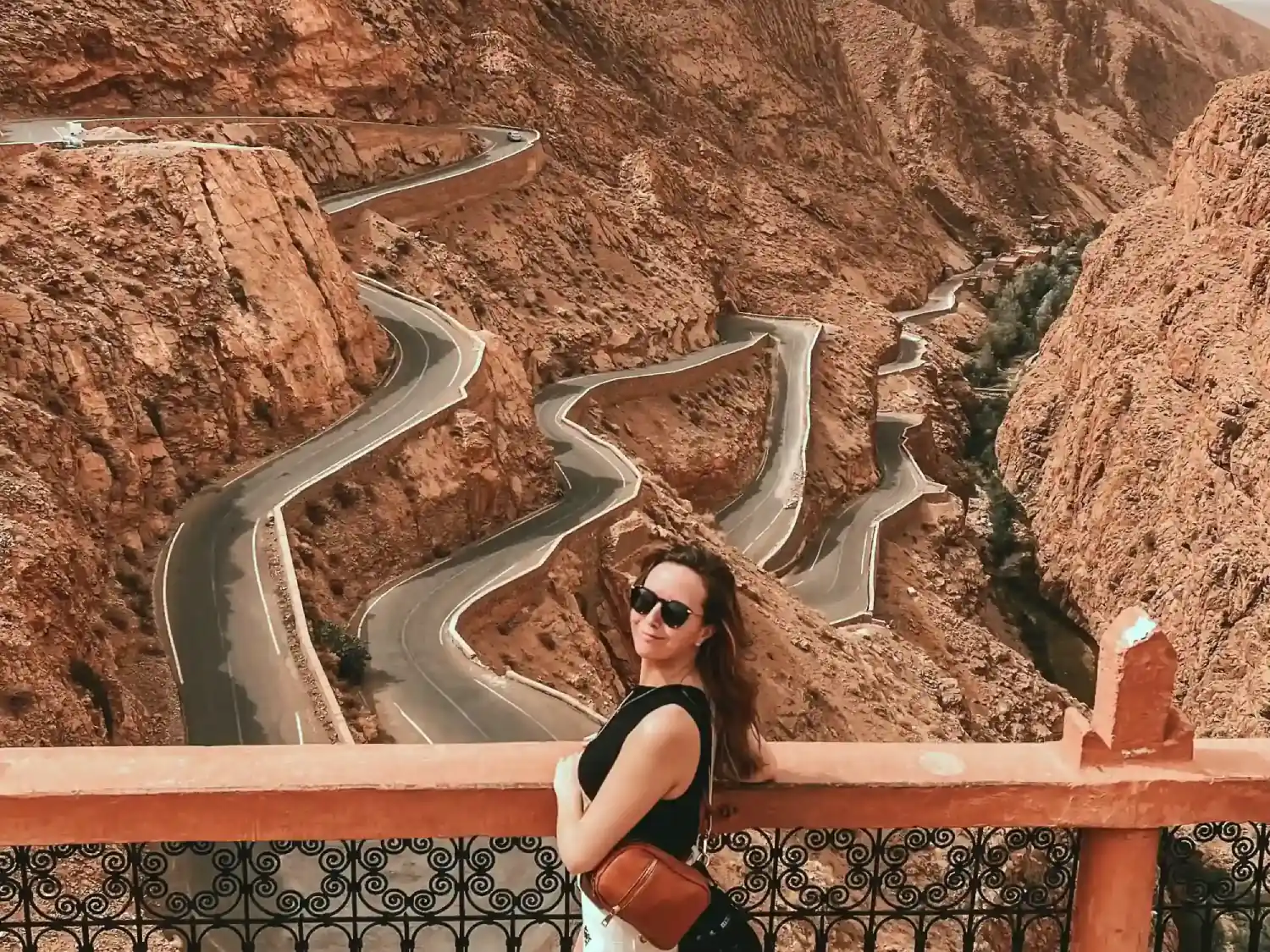
Get your Moroccan Car Rental Cleaned Before Handing it Back
Morocco is a dusty country; your rental car is very likely going to get filthy from the roads or surrounding landscape. Get your rental car washed before handing it back. Most major petrol stations have a wash station attached where you can take your car to be cleaned, and it only costs a few pounds. I’ve heard of some people getting charged for handing their rental car back dirty.
Moroccan Traffic Lights are Similar to Most Other Countries
The Moroccan Traffic Lights are pretty much identical to most of Europe and the United States. They have three standard lights: Red, yellow, and green. A blinking green light means to stop or slow down. What I loved about the traffic light system in Morocco was the countdown to let you know how long you were going to have to wait for it to change.
Avoid Driving in Winter in Morocco
I was in Morocco during the peak summer season when the temperatures were absolutely scorching, so I was shocked when a local told me that Morocco actually gets snow in the winter, and it’s not just a bit of snow, it can be A LOT. Morocco can experience snow as early as October and as late as March. These winter conditions would make driving more difficult in Morocco, but it can also cause sections of the roads to be completely closed, especially in remote areas such as the Atlas Mountains that can experience heavy snowfall.
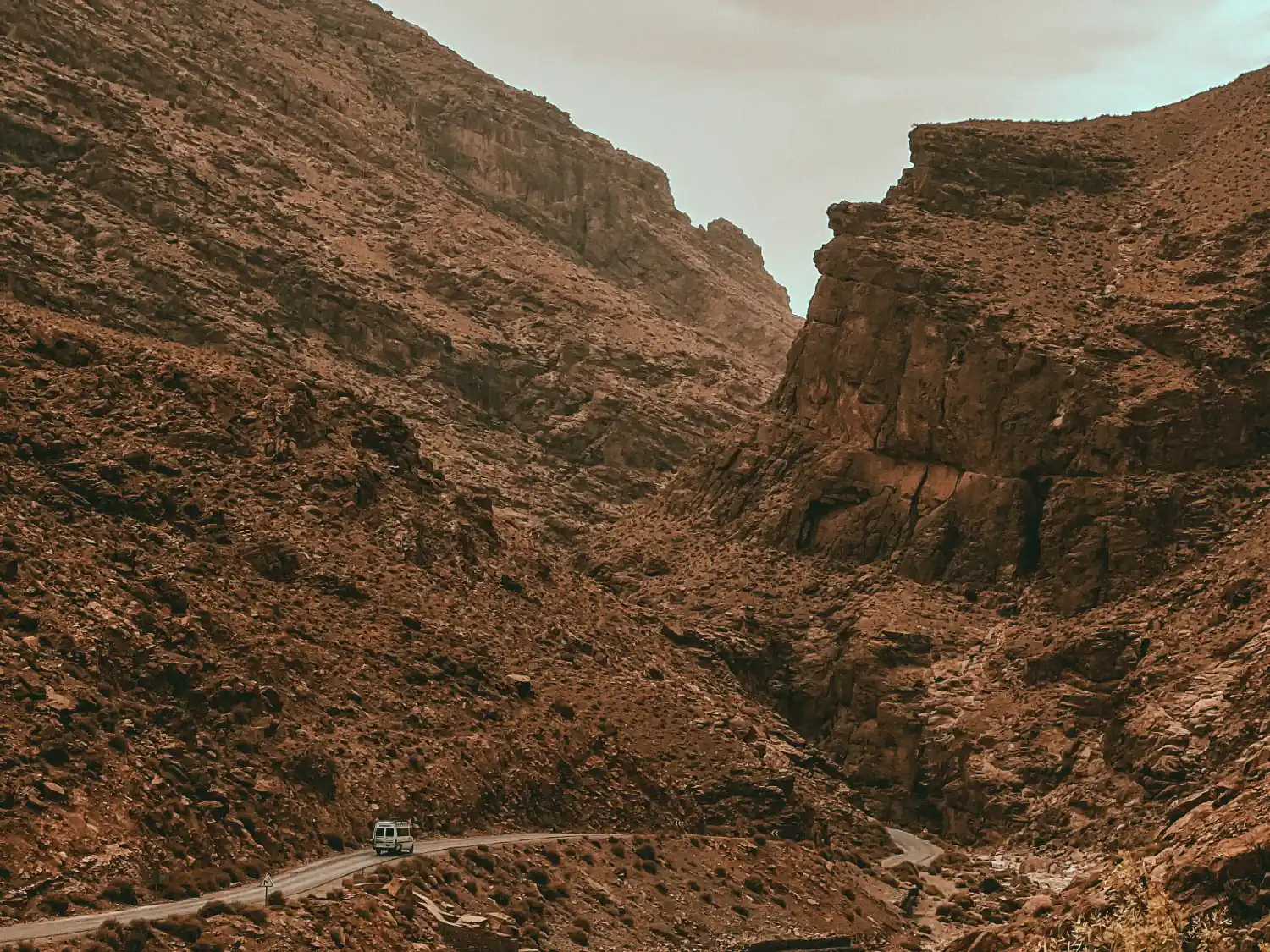
Leave Earlier in the Morning when Driving in Morocco
Getting from place to place in Morocco can take several hours. Most of my drives down to the Sahara Desert took around 4-5 hours per day. The drives in Morocco can be rather monotonous and can also take much longer than Google Maps says it will, especially if you are driving more cautiously or if you get stuck behind another vehicle. I’d recommend leaving earlier in the morning (~9 am) when the roads are much quieter, and that would give you plenty of time to stop off multiple times on longer drive days to stretch your legs and admire the scenery along the way.
Stock up on Bottles of Water for your Driving Trip
As I’ve mentioned above, there are parts of Morocco that are largely uninhabited, which means that you can drive for hours without seeing another soul. This obviously poses an issue if you were to break down in these areas, but you also don’t want to be stranded with no water, especially in the height of summer. I drove through Morocco during July, and the temperatures were often between 40-50°C (105-110°F). This temperature is almost unbearable to be out in, so we always tried to make sure we had a couple of bottles of water in the car to stay hydrated in case of any emergencies.
How Much Did My Car Rental Cost in Morocco?
- Renting a Manual Car: 7 Days x €40 = €280 (~£240)
- Car Insurance against Excess: €30 (~£26)
- Petrol for 7 Days: €110 (~£94)
TOTAL = €420 (~£358)
Support 24Countries
Don’t forget to drop a comment below, share my Pinterest pins, and subscribe to my blog to be kept up to date with new posts! Every bit of engagement helps grow my little travel blog!
If you would like to support the blog and keep me caffeinated during the writing process, you can support 24Countries by buying me a coffee.
This post is all about Driving in Morocco. Thanks for taking the time to read through this blog, it’s much appreciated!
Kirsty x
More Blog Posts You'll Love
